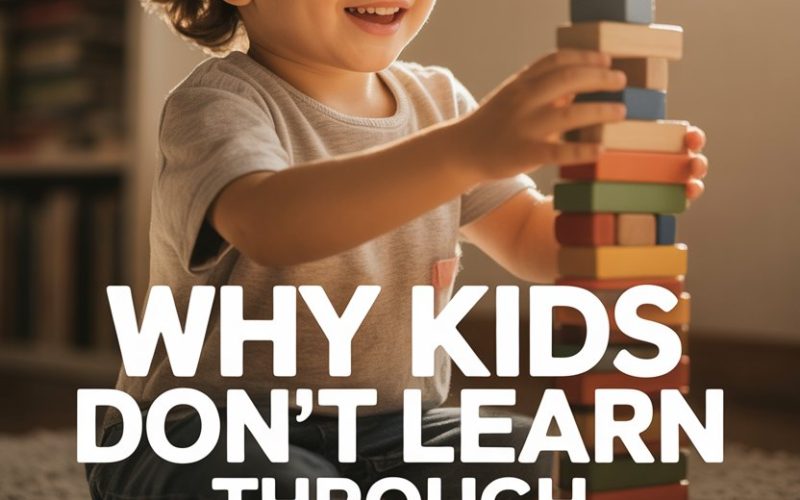It would be so much easier if a stern glare and a “Because I said so!” turned children into model citizens, wouldn’t it?
If only the world worked that way—less mess, fewer grey hairs, and quite possibly a National Parent-of-the-Year trophy.
Yet, every generation discovers the same truth: fear and control don’t raise healthy, resilient, or even obedient kids for long.
If anything, they generally produce better liars, sneakier snackers, and a household stocked with passive-aggressive tension.
Short-Term Obedience, Long-Term Problems
Fear-based parenting gets results… briefly. Children might snap to attention when you bark orders or threaten consequences.
But what’s really happening in their little minds? Are they learning right from wrong, or just rehearsing how not to get caught?
Multiple studies, including this one, show that harsh discipline or control breeds anxiety, lower self-esteem, and a deep well of resentment.
That’s not exactly the emotional toolkit we hope they’ll carry into adulthood.
And here’s the kicker: Kids trained under fear might comply while you’re watching, but they’re the first to rebel—or simply freeze—when you’re not.
Brains Wired for Safety, Not for Panic
Children’s brains aren’t engineered to thrive in a state of constant stress. When raised voices and harsh punishments loom, their nervous systems shift into “fight, flight, or freeze” mode.
Logical thinking and memory go on holiday. The amygdala (a tiny but powerful part of the brain that handles threats) takes the wheel, and the prefrontal cortex (where reasoning lives) goes off to make a cuppa.
This isn’t just armchair psychology.
Research confirms that chronic stress or fear changes brain development—sometimes for life. Children learn to scan for danger, not for lessons.
Remember the last time you tried to do your taxes while a car alarm blared outside? That’s your child, every time you use fear as a teaching tool.
Why Control Feels So Tempting
Every parent has visions of their child as a kind, responsible human being—preferably one who can find both shoes before 8 am.
Control gives the illusion of certainty. Strict rules, punishments, and micromanagement promise order and, dare I say, peace.
But here’s the rub: control confuses compliance with understanding. Kids may say “yes, Mum” to your face, but inside, they’re either plotting their escape or quietly shutting down.
Parenting experts agree: Children raised in controlling environments often struggle with decision-making, independence, and creativity. When every choice is made for them, why bother thinking for yourself?
What Really Teaches Kids: Connection, Not Control
Children aren’t tiny robots.
They’re small humans, complete with opinions, feelings, and a burning desire to be understood. They learn from people they trust, not those they fear.
Positive parenting research—such as the approaches outlined by Dr. Laura Markham—shows that secure attachment and warm connection are the bedrock of lasting behaviour change.
When kids feel seen and safe, their brains switch to “learning mode.” They mirror what you model and internalise your values for real.
No, this doesn’t mean chaos reigns and every request turns into a family negotiation that lasts until bedtime.
Boundaries are still necessary. But there’s a world of difference between a boundary and a brick wall.
The Illusion of Control Breeds Rebellion (or Perfectionism)
Raise your hand if your child has ever, in the history of parenting, responded to “Because I said so” with “Oh, brilliant, thanks for explaining!” No one? Shocking.
Control breeds one of two things: rebellion or compliance at the expense of self-worth.
Some children become little rebels, pushing back at every turn, determined to make their own choices—even if it means learning the hard way (read: the school’s lost property bin is overflowing with their jumpers).
Others morph into people-pleasers, terrified of making mistakes and desperate for approval.
Neither outcome is healthy. What’s needed is space to make choices, even small ones.
Today it’s which T-shirt to wear. Tomorrow it’s how to say no to peer pressure.
Curiosity Beats Threats, Hands Down
Think about the last time someone barked a demand at you. Did you feel motivated to cooperate, or did you mentally check out and start planning your next coffee break?
Children are no different.
When they’re curious, they’re engaged. When they’re threatened, they’re just trying to get out of the line of fire.
Switching from “You’d better do this or else!” to “I wonder what would happen if…” opens the door to real learning.
Try swapping “Don’t hit your brother or you’ll get a time out!” for “Your brother looks upset. What do you think you can do to help him feel better?”
It feels awkward at first—like trying to eat soup with chopsticks—but the payoff is worth it.
Mistakes Are Where the Magic Happens
Fear of punishment makes children expert hiders. Not in hide-and-seek, sadly, but in hiding their mistakes.
If dropping a glass means an earful, you can bet they’ll sweep the shards under the rug next time (ask me how I know).
Growth comes from messing up and making it right. Kids need room to fail, fix, and try again.
When mistakes are met with curiosity (“What happened here?”) instead of condemnation (“How could you be so careless?”), children learn responsibility—not just self-preservation.
Child development studies back this up: Kids who feel safe to make mistakes not only learn faster, they remember those lessons longer.
Connection in the Heat of the Moment
Staying calm when your child’s poured shampoo in the toilet (again) is up there with Olympic-level self-control. But here’s the thing—our response teaches far more than our words.
Kneeling down to your child’s level, taking a breath, and saying, “I can see you’re upset. Let’s talk about what happened” won’t fix the mess instantly. It does build trust, and trust is the secret sauce for actual change.
Attachment theory isn’t just psychobabble; it’s a roadmap for raising humans who don’t need decades of therapy to feel okay in their own skin.
Practical Strategies for Tonight’s Meltdown
Anyone can master gentle parenting when the sun’s out and everyone’s eaten.
The real test comes at 6:30 pm, three minutes before bedtime, when your little darling decides to practice karate on the dog. These moments are where new habits are forged.
- Pause and breathe. It’s not weakness, it’s wisdom.
- Get down to their level and listen, even if it’s just 30 seconds.
- Label feelings: “You’re mad because you wanted the blue plate.”
- Offer limited choices: “Do you want to brush your teeth before or after your story?”
- Keep boundaries simple: “It’s okay to feel angry. It’s not okay to hit.”
- Repair, don’t punish: “Let’s find a way to make things right with the dog.”
- Celebrate effort, not just outcome: “You worked so hard to calm down!”
None of these require a psychology degree, just a willingness to try something different.
The Myth of the “Good” Child
There’s a persistent idea floating around that a “good” child is a quiet, obedient child who never pushes back.
But what if the goal isn’t perfection, but progress? After all, we’re raising future adults, not Stepford kids.
Children who are allowed to question, make mistakes, and express feelings grow into adults who can stand up for themselves, show compassion, and bounce back from setbacks. The world desperately needs more of those.
Small Shifts, Big Changes
Moving away from fear and control can feel like learning to write with your non-dominant hand. Some days it will be messy and awkward.
There will be setbacks. The cat might hide under the bed. But every small shift matters.
Start with just one moment a day. When the urge to command or threaten bubbles up, pause and connect instead.
Notice what changes—maybe not in your child right away, but in your own stress level.
And if you slip? Welcome to the club. No one’s got this all figured out.
Raising Kids Who Think—Not Just Obey
The endgame isn’t children who jump when we say jump. It’s humans who think for themselves, make wise choices, and know their worth isn’t tied to someone else’s approval.
Fear and control might win a battle or two, but connection and respect win the war for your child’s heart and mind. That’s a legacy worth fighting for—no scary glares required.





